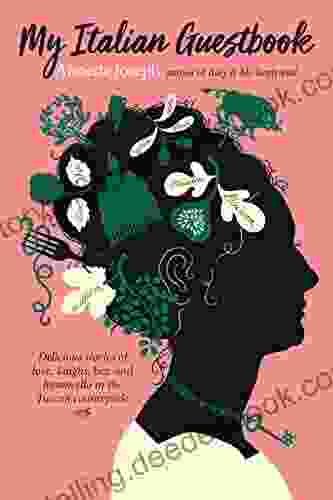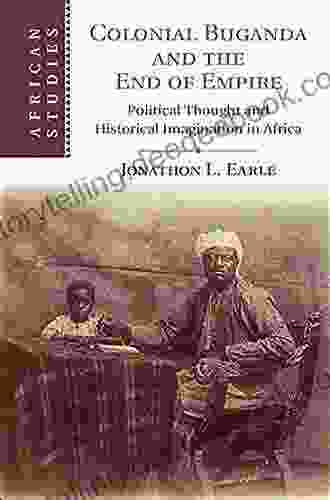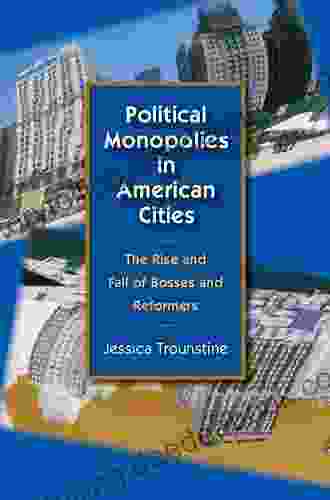Colonial Buganda and the End of Empire: A Detailed Historical Account

Uganda, located in East Africa, is a land with a rich and diverse history. During the late 19th century, the Buganda Kingdom, one of the most powerful kingdoms in the region, became a crucial piece in the British Empire's expansion in East Africa. This article provides a comprehensive overview of Colonial Buganda, examining its political, economic, social, and cultural landscape, as well as the factors that ultimately led to the end of British rule and the emergence of an independent Uganda.
4 out of 5
| Language | : | English |
| File size | : | 10012 KB |
| Text-to-Speech | : | Enabled |
| Enhanced typesetting | : | Enabled |
| Word Wise | : | Enabled |
| Print length | : | 301 pages |
| Screen Reader | : | Supported |
The Establishment of Colonial Rule
In 1894, the Buganda Kingdom signed a treaty with the British East Africa Company, granting the company control over the kingdom's foreign affairs. This treaty marked the beginning of British influence in Buganda. In 1896, the British government established a protectorate over Buganda, giving them full administrative control over the kingdom.
The British implemented a system of indirect rule in Buganda, which allowed the kingdom's traditional political structures to remain largely intact. The British governor worked through the Kabaka (king) and his chiefs, who maintained their authority over local affairs. However, the British exerted significant influence over the kingdom's policies and decision-making processes.
Economic Transformations
Colonial rule brought about significant economic changes in Buganda. The British introduced a cash crop economy, encouraging the cultivation of cotton and coffee for export. This led to the expansion of agricultural production and the emergence of a class of wealthy landowners. However, the cash crop economy also made Buganda vulnerable to fluctuations in global commodity prices.
The British also invested in infrastructure development, including the construction of roads, railways, and telegraph lines. These improvements facilitated trade and communication, contributing to the economic growth of the region.
Social and Cultural Changes
Colonialism had a profound impact on the social and cultural fabric of Buganda. The British introduced a new education system, which emphasized the teaching of English and Christian values. This led to the gradual erosion of traditional Buganda culture and the rise of a new elite class educated in Western ideals.
The colonial administration also imposed a number of restrictions on Buganda customs and practices, such as the abolition of slavery and the suppression of certain religious rituals. These changes caused resentment and resistance among the Buganda population.
African Resistance and the Rise of Nationalism
Buganda was not immune to the growing tide of African nationalism that swept across the continent in the 20th century. In the 1920s and 1930s, a number of political organizations emerged, advocating for greater autonomy and eventual independence from British rule.
The most prominent of these organizations was the Uganda National Congress (UNC),founded in 1952. The UNC brought together a diverse coalition of Buganda and non-Buganda nationalists, who worked together to challenge British authority.
The Independence Movement
In the 1950s, the independence movement in Buganda gained momentum. The Buganda government, led by Kabaka Mutesa II, pursued a policy of "separation," seeking to break away from the British protectorate and establish a fully independent Buganda Kingdom.
The British government resisted these demands, leading to a period of tension and conflict. In 1962, a compromise was reached, and Uganda gained independence as a constitutional monarchy, with Kabaka Mutesa II as its first president.
The End of Empire
The independence of Uganda marked the end of British imperial rule in the region. Buganda's experience under colonial rule was complex and multifaceted. The British introduced significant economic and social changes, but they also imposed their own political and cultural values on the kingdom.
The struggle for independence was a long and arduous one, but it ultimately led to the establishment of a sovereign Uganda. Buganda's legacy as a powerful kingdom and a center of African nationalism continues to shape Uganda's history and politics today.
Colonial Buganda stands as a testament to the complex and often contradictory nature of colonialism. The British Empire brought about significant changes to Buganda, both positive and negative. However, it also sowed the seeds of nationalism and resistance, which ultimately led to the end of imperial rule and the emergence of an independent Uganda.
4 out of 5
| Language | : | English |
| File size | : | 10012 KB |
| Text-to-Speech | : | Enabled |
| Enhanced typesetting | : | Enabled |
| Word Wise | : | Enabled |
| Print length | : | 301 pages |
| Screen Reader | : | Supported |
Do you want to contribute by writing guest posts on this blog?
Please contact us and send us a resume of previous articles that you have written.
 Book
Book Story
Story Library
Library Paperback
Paperback E-book
E-book Newspaper
Newspaper Paragraph
Paragraph Bookmark
Bookmark Shelf
Shelf Bibliography
Bibliography Foreword
Foreword Preface
Preface Footnote
Footnote Scroll
Scroll Classics
Classics Library card
Library card Narrative
Narrative Biography
Biography Autobiography
Autobiography Memoir
Memoir Thesaurus
Thesaurus Resolution
Resolution Catalog
Catalog Borrowing
Borrowing Stacks
Stacks Archives
Archives Periodicals
Periodicals Study
Study Scholarly
Scholarly Lending
Lending Reading Room
Reading Room Literacy
Literacy Study Group
Study Group Thesis
Thesis Dissertation
Dissertation Storytelling
Storytelling Awards
Awards Reading List
Reading List Theory
Theory Textbooks
Textbooks Shenaia Lucas
Shenaia Lucas Jim Mcghee
Jim Mcghee Nicolas Forgue
Nicolas Forgue Vijay Seshadri
Vijay Seshadri Dick Mccaw
Dick Mccaw Pegasus Publishing
Pegasus Publishing Travis Thrasher
Travis Thrasher Jeff Kirkham
Jeff Kirkham Perry Shaw
Perry Shaw James Bassil
James Bassil L C Mortimer
L C Mortimer Lisa Caprelli
Lisa Caprelli Barry Flicker
Barry Flicker Merete Kruuse
Merete Kruuse Alex S Vitale
Alex S Vitale Jessica Trounstine
Jessica Trounstine Michael O Slobodchikoff
Michael O Slobodchikoff Ted Slupik
Ted Slupik Aimee Seu
Aimee Seu 2011th Edition Kindle Edition
2011th Edition Kindle Edition
Light bulbAdvertise smarter! Our strategic ad space ensures maximum exposure. Reserve your spot today!

 Elliott CarterShort Story of Endurance and Adversity in the Arctic Greenland Crime Stories
Elliott CarterShort Story of Endurance and Adversity in the Arctic Greenland Crime Stories Jonathan FranzenFollow ·2.1k
Jonathan FranzenFollow ·2.1k Evan SimmonsFollow ·14.3k
Evan SimmonsFollow ·14.3k Oliver FosterFollow ·11.1k
Oliver FosterFollow ·11.1k Milton BellFollow ·3.9k
Milton BellFollow ·3.9k Will WardFollow ·15.8k
Will WardFollow ·15.8k Joshua ReedFollow ·19.9k
Joshua ReedFollow ·19.9k Hassan CoxFollow ·10.1k
Hassan CoxFollow ·10.1k Rod WardFollow ·6.7k
Rod WardFollow ·6.7k

 Howard Blair
Howard BlairClassical Music Themes for Easy Mandolin, Volume One
Classical Music Themes for Easy Mandolin,...

 Paulo Coelho
Paulo CoelhoThe Heretic Tomb: Unraveling the Mysteries of a Lost...
Synopsis In Simon Rose's captivating debut...

 Rodney Parker
Rodney ParkerThe Passionate Friends Annotated Wells: A Deeper...
Unveiling the...

 Ed Cooper
Ed CooperDelicious Stories of Love, Laughs, Lies, and Limoncello...
In the heart of...

 Elmer Powell
Elmer PowellHal Leonard Piano For Kids Songbook: Unleashing the...
Music holds immense...
4 out of 5
| Language | : | English |
| File size | : | 10012 KB |
| Text-to-Speech | : | Enabled |
| Enhanced typesetting | : | Enabled |
| Word Wise | : | Enabled |
| Print length | : | 301 pages |
| Screen Reader | : | Supported |












